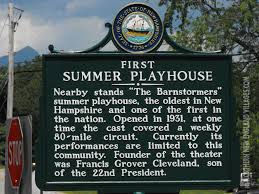Backstage with Francis Cleveland
- Jane Golden
- Jul 8, 1977
- 4 min read
It's been 46 years since Francis Cleveland and his troupe first stormed barns in New Hampshire, and his life since has been greatly influenced, if not dictated, by the audience response that first season - small but enthusiastic, warm and inviting - conclusive evidence that there was indeed a market for summer theatre in the North Country. That year and every one since 1931 (with only a modest break during the war years), Cleveland has run The Barnstormers in Tamworth, the oldest summer theatre still in operation in New Hampshire. "Am I interested in theatre?" he asked then answered his own question. "No, just one kind, my own."

An acting buff since his younger days at Exeter, Cleveland credits his interest to the pre-natal influence of Joe Jefferson, a famous thespian of the late 18th century and close friend of his illustrious father, Grover Cleveland, the 22nd and 24th president of the United States, who, by the way, earned the double number distinction by being elected on two separate occasions, 1885-1889 and 1893-1897. The youngest of five children, Cleveland was never interested in running for office himself, but then again, neither were his siblings, including his sister Esther who was born in the White House and now lives across the road from him on Cleveland Hill in Tamworth.
Francis Cleveland was born, fittingly enough in Bourne, Mass., on Cape Cod, and even though his father had been out of the presidency for six years, he recalls, the house was always a center of activity. Did growing up in a famous family have much effect on his youth? "No" he replied. "I know it sounds boring, but it's true. Everyone loved my father and mother, and I don't think it mattered that he had once been president. In fact," he added, "I'm not sure that it weren't a detriment. Sometimes, you don't feel that you got where you did on your own."

Maybe, he laughed, his background helped him be elected class officer in prep school, but he regretted the way the head mistress of the boarding school he attended as a youngster introduced him as the president's son to all the prospective students. It might have mattered at Harvard, he smiled again, if Grover had been a Republican, but the students and faculty at the conservative stronghold were less than impressed with Democrats, regardless of their status.
"I probably should have stayed at Princeton," where his family was living at the time, but he followed his classmate and roommate John Finley to Cambridge. When Finley, whose land borders Cleveland's in Tamworth, retired from the Harvard faculty last year, he was hailed as the true Renaissance man. "I never told John," said Cleveland, "but I didn't enjoy Harvard."
Shortly after college and a few teaching positions, he married his wife Alice, whom he had known all his life and just drifted into the theatre. His first professional role was in "The Night Remembers" and "no one else does," he said. But it opened a few doors and led to his getting the part of a policeman in the original New York production of Thornton Wilder's "Our Town" which ran for a year on Broadway. "Even though it was a small role," he said, "I was an understudy for the big policeman, and he was drunk a good deal of the time."
Despite the lure of New York, he often returned to the family summer house in Tamworth, which his father had bought in 1904, four years before his death in 1908. the idea of organizing a theatre and performing for the summer residents seemed a natural one. Others agreed, and by 1935, the company which called itself the Barnstormers ("I never liked the name") moved into their permanent home in the center of Tamworth village. "There were very few resident companies in those days," he said, and despite what might appear as a boom, there are still only 16 or 17 resident equity houses in the country today.
By 1940, he had had enough of the big city and became a permanent citizen, community leader (selectman for 12 years), and a full time resident of the town of Tamworth. A few years later, he also assumed the role of directing the entire Barnstomers season - a job he continues even today.
It's a long summer for Cleveland, but it starts in January when he first decides what shows the company will produce. Once the season starts, he barely lifts his head to Labor Day. Eight different shows in eight weeks, and he had never yet missed a performance. He says now that he's slowing down, disguising a spirit that belies his 74 years. He's letting someone else direct two of the plays this summer, but he's been out front running the other six. He returns to the stage occasionally, and even though "I think I'm a better actor now than when I was younger," he prefers the director's chair. " I choose the plays and I care about them and I have my own ideas on how I would like them to be done."
Besides being the oldest, The Barnstormers is also one of the most successful theatres in the state. "We have a very good, long-standing relationship with our audiences," he said. "They like what we do, and we do what they like to see."
Paraphrasing a character in a play he directed this summer, whose philosophy in part reflects his own, "Never hate audiences . . .when they come together in a theatre, they're divine."
Postscript: Francis Grover Cleveland passed away at age 92 in 1995. His sister Esther died in 1980 at age 86.

Comments